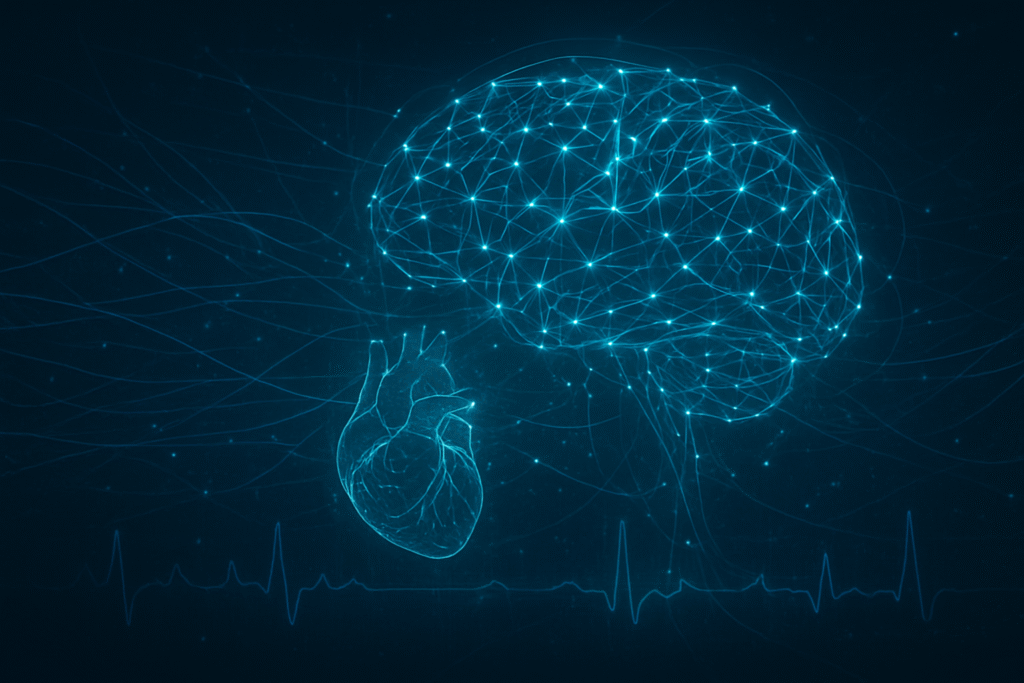
ROCHESTER, MN – November 5, 2025 – In a landmark development set to redefine healthcare diagnostics, Mayo Clinic researchers have unveiled an innovative artificial intelligence (AI) algorithm capable of detecting obstructive sleep apnea (OSA) with remarkable accuracy using standard electrocardiogram (ECG) results. Announced on November 4, 2025, with findings published in JACC: Advances, this breakthrough promises to make screening for this pervasive and often undiagnosed condition faster, cheaper, and significantly more accessible, particularly for women who frequently suffer from delayed or missed diagnoses.
This AI-powered ECG analysis represents a pivotal shift from traditional, cumbersome sleep studies, offering a non-invasive and efficient method to identify the subtle cardiac signatures of sleep apnea. The immediate significance of this innovation lies in its potential to dramatically improve early detection rates, leading to timely interventions that can mitigate the severe cardiovascular and other health risks associated with untreated OSA, thereby enhancing global public health.
Unpacking the Algorithm: A Deep Dive into AI-ECG Diagnostics
The core of Mayo Clinic's groundbreaking technology is a sophisticated deep convolutional neural network (CNN) model, aptly referred to as the "AI-ECG model." This advanced AI is trained to discern specific patterns within a routine 12-lead electrocardiogram, which captures the electrical activity of the heart. These patterns, imperceptible to the human eye, signify the subtle yet critical impacts of obstructive sleep apnea on heart muscle cells.
The algorithm's development was a meticulous process, leveraging a vast retrospective dataset of 11,299 patients from the Mayo Clinic. Each patient had undergone both a 12-lead ECG and a comprehensive sleep evaluation, with over 7,000 confirmed OSA diagnoses and 4,000 serving as controls. This extensive training allowed the AI to learn and identify the "OSA signature" within the ECG data. In test samples, the AI-ECG model achieved an impressive Area Under the Curve (AUC) of 0.80, with an accuracy of 73.7%, sensitivity of 77.0%, and specificity of 68.6%. Notably, the model exhibited superior performance in females (AUC: 0.82) compared to males (AUC: 0.73).
This AI-ECG approach starkly contrasts with traditional polysomnography (PSG), the current gold standard for sleep apnea diagnosis. PSG requires an overnight stay in a specialized sleep laboratory, involving numerous sensors and extensive physiological monitoring – a process that is expensive, time-consuming, and often inconvenient. While PSG provides comprehensive data, the AI-ECG offers a scalable, low-cost screening alternative that can be integrated into routine clinical practice, identifying individuals who warrant further, more definitive sleep evaluations. Initial reactions from the AI research community and industry experts have been overwhelmingly positive, recognizing its potential for widespread, low-cost screening and its robust performance, especially in addressing the diagnostic gap for women.
Reshaping the Landscape: Impact on AI Companies and Healthcare Tech
Mayo Clinic's AI breakthrough is poised to send ripples across the AI industry, profoundly impacting AI companies, tech giants, and startups alike. The successful validation of an AI algorithm detecting complex medical conditions from routine ECGs will undoubtedly accelerate investment and research into similar non-invasive diagnostic tools, particularly those leveraging widely available data sources.
Companies specializing in AI-driven ECG platforms, such as Peerbridge Health, which also focuses on AI-ECG for OSA, stand to benefit significantly. Wearable device manufacturers, including tech giants like Apple (NASDAQ: AAPL) (which already collaborates with Mayo Clinic on AI-ECG algorithms for cardiovascular health monitoring via the Apple Watch), could integrate sleep apnea detection into their offerings, enhancing device utility and market appeal. Furthermore, home sleep testing and monitoring companies, alongside healthcare AI startups focused on diagnostic algorithms, will find a more receptive market and investment landscape, fostering innovation in accessible and remote health solutions. Mayo Clinic itself, through initiatives like Mayo Clinic Platform_Insights, is actively working to help other health systems adopt AI, and has even spun off companies like Anumana to commercialize AI algorithms.
The competitive implications for major AI labs and tech companies are substantial. There will be an intensified focus on research and development in AI-driven ECG analysis for a broader spectrum of conditions. Clinical validation and regulatory approval, such as FDA clearance for Software as a Medical Device (SaMD), will become paramount competitive differentiators. Access to diverse, high-quality patient data will be a critical strategic advantage, potentially leading to more partnerships and acquisitions. This development also underscores the increasing demand for ethical AI development, emphasizing transparency, bias mitigation, and regular auditing.
The potential for disruption to existing products and services is considerable. While PSG will likely remain the gold standard for definitive diagnosis, the AI-ECG approach could significantly reduce the volume of initial sleep studies, democratizing sleep apnea screening and making it accessible in primary care settings or even via consumer wearables. This shift could lead to earlier detection and prevention of severe complications, potentially impacting the market for advanced-stage sleep apnea treatments. Companies that can seamlessly integrate AI-ECG solutions into existing clinical workflows, demonstrate cost-effectiveness, and offer enhanced patient convenience will secure a strong market position and strategic advantage.
A Broader Lens: Significance in the AI Landscape and Beyond
This innovation from Mayo Clinic firmly places itself within the broader trajectory of AI revolutionizing healthcare diagnostics, aligning with current trends towards advanced, integrated, and explainable AI solutions. It exemplifies the power of AI to efficiently mine vast medical datasets, moving beyond traditional imaging analysis to leverage routine physiological signals for complex disease detection.
The public health implications are profound. With over 936 million adults worldwide affected by OSA and a significant portion undiagnosed, this accessible screening method could lead to a massive increase in early diagnoses. Timely interventions can then significantly reduce the global burden of cardiovascular disease, cognitive decline, and other comorbidities linked to untreated sleep apnea. For medical practice, it promises to simplify and accelerate diagnosis, enhance precision through personalized insights, improve treatment management, and expand diagnostic reach into routine clinical settings.
Crucially, this AI algorithm carries significant implications for health equity. Women, often underdiagnosed due to atypical symptoms or diagnostic biases, could benefit immensely from the AI's ability to detect stronger apnea-related signals in their ECGs, addressing a critical disparity in care. By making diagnostics more affordable and convenient, AI-driven tools can help bridge care gaps for underserved populations, fostering more equitable access to essential health screenings.
However, as with all AI in healthcare, potential concerns must be addressed. Data privacy and security remain paramount, necessitating robust anonymization and consent frameworks. Algorithmic bias is another critical consideration; while the AI showed promise for women, ensuring diverse training datasets and rigorous validation across all demographics is vital to prevent exacerbating existing health disparities. The risk of over-diagnosis or false positives, leading to unnecessary anxiety or further testing, also highlights the need for transparency, explainability, and a "human-in-the-loop" approach where clinical judgment remains central. This breakthrough builds upon earlier AI milestones in medical imaging and automated sleep scoring, pushing the boundaries by leveraging readily available data and addressing specific population needs.
The Road Ahead: Future Developments and Expert Predictions
The future of Mayo Clinic's AI for sleep apnea detection points towards an increasingly integrated and personalized healthcare ecosystem. In the near term, efforts will likely focus on refining the algorithm for even greater accuracy, particularly in diverse populations, and facilitating its seamless integration into existing clinical workflows across various health systems. The ability to assess the cardiovascular impact of OSA treatments via ECG will be a key area of continued research, offering a more personalized approach to patient management.
Long-term developments envision AI playing a monumental role across the entire spectrum of sleep medicine—from comprehensive screening and monitoring to personalized treatment selection and a deeper understanding of OSA's pathophysiology. Experts predict that AI will empower clinicians to select the most effective, individualized treatments, anticipate adherence to therapies like CPAP, and identify early signals of treatment failure, thereby significantly improving patient outcomes.
Potential applications and use cases are vast. Enhanced at-home diagnostics will likely see the AI integrated with existing and future wearable devices capable of collecting ECG data, such as smart watches and rings, making screening more convenient than ever. Remote patient monitoring will become more sophisticated, allowing continuous oversight and timely adjustments to treatment plans. Furthermore, integration with Electronic Health Record (EHR) systems could automatically flag at-risk patients, prompting earlier clinical attention and enabling population-level screening.
Despite the immense promise, challenges for widespread adoption remain. Regulatory hurdles and the need for rigorous validation will continue to shape the path to market. Addressing data biases and ensuring data integrity are crucial to building trust and preventing health inequities. The absence of a standardized ethical framework for AI in healthcare, alongside the practical challenges of integrating new AI tools into complex clinical environments and securing physician acceptance, will require concerted effort. Experts emphasize that AI will serve as a powerful assistive tool for sleep specialists, enhancing efficiency by automating tasks like sleep study scoring and medical charting, ultimately freeing up clinicians to focus on direct patient care. They foresee AI having a fundamental and enduring impact on patient engagement, assessment, and treatment, transforming how sleep is studied and understood.
A New Era in Sleep Diagnostics: Comprehensive Wrap-Up
Mayo Clinic's unveiling of an AI algorithm for ECG-based sleep apnea detection marks a significant moment in the convergence of artificial intelligence and healthcare. The key takeaway is the creation of a faster, more accessible, and cost-effective screening tool that holds particular promise for addressing the historical underdiagnosis of sleep apnea in women, thanks to the AI's ability to detect stronger disease signals in their ECGs. This innovation moves beyond traditional diagnostic limitations, offering a pathway to earlier intervention and improved patient outcomes for a condition affecting nearly a billion people globally.
This development is a testament to AI's growing maturity in medical diagnostics, showcasing its capacity to extract clinically meaningful insights from routine data sources. Its long-term impact on healthcare is poised to be transformative, shifting sleep apnea diagnosis from specialized labs into broader clinical settings, fostering preventive care, and enabling highly personalized medicine. However, the journey forward will necessitate careful navigation of ethical considerations, including data privacy, algorithmic fairness, and the critical importance of maintaining human oversight in clinical decision-making.
In the coming weeks and months, observers should keenly watch for further validation studies and larger-scale clinical trials that cement the AI's accuracy across diverse patient populations. Regulatory approvals from bodies like the FDA will be a crucial indicator of its readiness for widespread clinical integration. Beyond Mayo Clinic's direct implementation, pay attention to commercialization announcements, partnerships, and evidence of the AI's impact on increasing diagnosis rates in previously underserved groups. More broadly, the healthcare AI landscape will continue to evolve with advancements in wearable and home-based diagnostics, personalized treatment and monitoring solutions, and the ongoing development of robust ethical AI governance frameworks. This breakthrough signals a new era in sleep diagnostics, where AI empowers earlier, more equitable, and more effective care.
This content is intended for informational purposes only and represents analysis of current AI developments.
TokenRing AI delivers enterprise-grade solutions for multi-agent AI workflow orchestration, AI-powered development tools, and seamless remote collaboration platforms.
For more information, visit https://www.tokenring.ai/.





